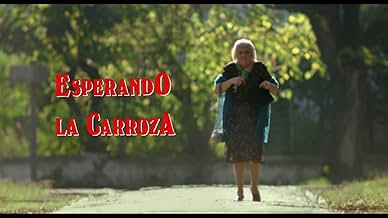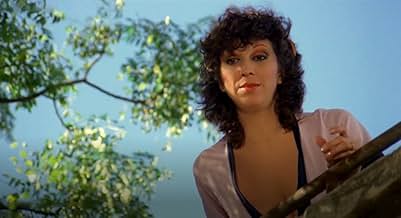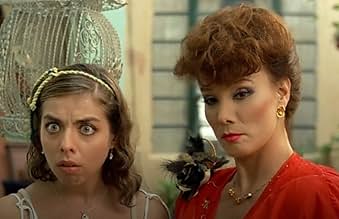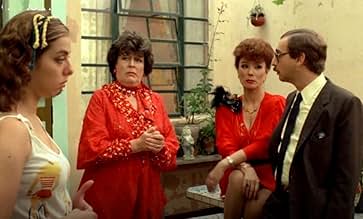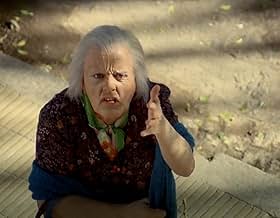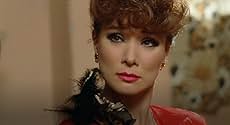Ajouter une intrigue dans votre langueEach member of this family tries to endorse someone else to care for the old Mother.Each member of this family tries to endorse someone else to care for the old Mother.Each member of this family tries to endorse someone else to care for the old Mother.
- Réalisation
- Scénario
- Casting principal
Avis à la une
10Horacito
I saw this movie plenty of times. My kids remember every line. And every time I discovered myself laughing, thinking and getting inspired more and more. Some magnificent actors, an exceptional screenplay! "Esperando la carroza", that could be translated as "Waiting for the funeral" is a perfect exposure of a lot of Argentine´s shortcomings and some Argentine´s virtues. China Zorrilla is superb...
This film, boisterously noisy and overcharged with frantic bursting vitality, shows us a slice of Mediterranean life in a Buenos Aires (Argentina) humble working class neighborhood (Buenos Aires includes 49 neighborhoods and 11 million inhabitants, including the surrounding jurisdictions). Only half a dozen of them could be considered middle class, another four or five high class; the rest the working, poorer class.
From the beginning the tottering figure of Mamá Cora (Antonio Gasella in drag and full make up as an old lady), dizzily walking alone towards the camera in a long shot, accompanied by Feliciano Brunelli's accordion yodeling a sort of polka music from the 50s (he was extremely popular with the masses at that time), sets the mood for what is coming (And what is coming is consistently and relentlessly amusing and in crescendo to the very end of the movie, here again, the very cheerful Feliciano Brunelli's accordion closes the last credits, and you feel like having eaten a great dish of tasty ravioli with sauce and grated Provolone cheese in abundance).
A crazily-quilted interaction of dislocated characters mouthing lively dialogue (Gross..., oh, SO gross... both characters and dialogue) and having a ball. They talk and talk at dizzying speed (I doubt very much that the translation can really catch up with the double entendre of half of the overlapping dialogue, for most of the time ALL of them are screaming at the top of their voices and simultaneously).
All actors grasp the screwball comedy style of this director (Alejandro Doria) beautifully. Subtlety is not even remotely connected with this outrageous comedy.
Mónica Villa (Susana) is outstandingly good as the long-suffering housewife always on the verge of an earth shaking nervous breakdown, looking like a wet mouse. One wonders if the actress didn't really break down! So authentic is her performance full of passion and vital detail (Bette Davies would have killed for this role).
Her mother in law, Mamá Cora (Antonio Gasella in drag) is driving her nuts with her full-fledge Alzheimer. Gasella does an excellent interpretation of this dizzy old lady loosing all her bearings, but I don't get it: Why was he chosen to play this role when towards the end appears a real old lady (A friend of Mamá Cora that comes to the house) that could have been THE perfect Mamá Cora (I think that Gasella must have been a popular comic at the time and maybe he made that character popular, I guess).
Betiana Blum (Nora), excellent (In very broad and obvious acting terms) as the flashy nouveau-riche wife of one of the three brothers in the story and the only pretty female in the cast.
China Zorrilla (a very well known and loved actress in Argentina, that even now, 22 years later is still going strong and is very convincing within the limits of her overheated and theatrical school of acting.
Darío Grandinetti: I failed to notice him in this old movie, maybe because he was too young then.
All performances are uniformly good. The director conventional but very efficient, since with his ear for tempo keeps everything firmly under control and makes it fun to watch, although it is blatant and flashy in a very heavy-handed way.
Only to be seen when you long for a Marx Brothers film but don't have one handy.
From the beginning the tottering figure of Mamá Cora (Antonio Gasella in drag and full make up as an old lady), dizzily walking alone towards the camera in a long shot, accompanied by Feliciano Brunelli's accordion yodeling a sort of polka music from the 50s (he was extremely popular with the masses at that time), sets the mood for what is coming (And what is coming is consistently and relentlessly amusing and in crescendo to the very end of the movie, here again, the very cheerful Feliciano Brunelli's accordion closes the last credits, and you feel like having eaten a great dish of tasty ravioli with sauce and grated Provolone cheese in abundance).
A crazily-quilted interaction of dislocated characters mouthing lively dialogue (Gross..., oh, SO gross... both characters and dialogue) and having a ball. They talk and talk at dizzying speed (I doubt very much that the translation can really catch up with the double entendre of half of the overlapping dialogue, for most of the time ALL of them are screaming at the top of their voices and simultaneously).
All actors grasp the screwball comedy style of this director (Alejandro Doria) beautifully. Subtlety is not even remotely connected with this outrageous comedy.
Mónica Villa (Susana) is outstandingly good as the long-suffering housewife always on the verge of an earth shaking nervous breakdown, looking like a wet mouse. One wonders if the actress didn't really break down! So authentic is her performance full of passion and vital detail (Bette Davies would have killed for this role).
Her mother in law, Mamá Cora (Antonio Gasella in drag) is driving her nuts with her full-fledge Alzheimer. Gasella does an excellent interpretation of this dizzy old lady loosing all her bearings, but I don't get it: Why was he chosen to play this role when towards the end appears a real old lady (A friend of Mamá Cora that comes to the house) that could have been THE perfect Mamá Cora (I think that Gasella must have been a popular comic at the time and maybe he made that character popular, I guess).
Betiana Blum (Nora), excellent (In very broad and obvious acting terms) as the flashy nouveau-riche wife of one of the three brothers in the story and the only pretty female in the cast.
China Zorrilla (a very well known and loved actress in Argentina, that even now, 22 years later is still going strong and is very convincing within the limits of her overheated and theatrical school of acting.
Darío Grandinetti: I failed to notice him in this old movie, maybe because he was too young then.
All performances are uniformly good. The director conventional but very efficient, since with his ear for tempo keeps everything firmly under control and makes it fun to watch, although it is blatant and flashy in a very heavy-handed way.
Only to be seen when you long for a Marx Brothers film but don't have one handy.
Or en espanol, Esperando la Corrazzo. Mama Cora has been living with Jorge and Susana for four years now, and is starting to go senile. She's doing crazy things that drive Susana crazy. The couple needs a break from mama, and they talk to the other siblings about taking her for a while. So much arguing, cussing, accusing, yelling, bringing up old conflicts, affairs... Meanwhile.... there's a report of an old lady found dead across town, so of course they rush over to see if it's really her. Mistakes are made, more arguing. Some really funny stuff in here. a farce. Lot's of surprises in this one! found this one on netflix while I was looking for something else. Great stuff! Original Play by Jacobo Langsner. Directed by Alejandro Doria. this one seems like an Almodovar film. family conflicts, arguing, secrets coming out. although the conversations are all faster and louder.
To watch this film is to open your mind to an extreme point of laugh. Excellent performances and a beautiful art direction, this film becomes in Argentina's greatest comedy ever.
10gosti82
This movie is extremely interesting. It shows the reality of a typical Argentinian family (In the 80s, but more or less the same story is happening nowadays). Basically the movie is about an *ancient* lady who is almost left alone by her own family, because as she is old and annoying nobody want to live with her. So every member of the family tries to avoid the idea of having *mommy* at home, but when they find out that she got lost, they start to seem worried. You should see this film if you enjoy sarcastic comments, funny dialogs and lovely characters. Every actor/actress in this movie is a real good one.
Le saviez-vous
- AnecdotesAll the houses that appear in the film are very close to each other in the same Buenos Aires neighborhood, Versalles. The main house (Elvira and Sergio's) became too old with the years. It was about to face demolition but the city's government decided to mark it as a cultural landmark and it was totally repaired. Now, it is a site of pilgrimage for thousands of fans who visit it all year round to take pictures and tour around the neighborhood. The house is inhabited by the same family who owned it at the time of the filming. They even have a female dog as pet named after one of the characters in the movie: "Matilde" (the young daughter of Elvira and Sergio).
- Citations
Antonio: [in the car, eating an empanada he picked up from some very poor relative's house] What misery! What misery! Do you know what did they have for lunch?
Sergio: [looking at the empanada Antonio is eating] Empanadas.
Antonio: Three of them. It broke my heart! Three leftover empanadas from last night's dinner for two people! God, how little you can do to help people!
- ConnexionsFeatured in AM - Antes del mediodía: Épisode datant du 24 octobre 2012 (2012)
- Bandes originalesBarrilito de Cerveza
("Skoda lásky")
Written by Jaromir Vejvoda with Wladimir A. Timm and Lew Brown
Performed by Feliciano Brunelli y orquesta
Meilleurs choix
Connectez-vous pour évaluer et suivre la liste de favoris afin de recevoir des recommandations personnalisées
- How long is Waiting for the Hearse?Alimenté par Alexa
Détails
- Date de sortie
- Pays d’origine
- Langue
- Aussi connu sous le nom de
- Waiting for the Hearse
- Lieux de tournage
- Versalles, Buenos Aires, District fédéral, Argentine(Plaza Ciudad de Banff)
- Sociétés de production
- Voir plus de crédits d'entreprise sur IMDbPro
Box-office
- Montant brut mondial
- 596 550 $US
Contribuer à cette page
Suggérer une modification ou ajouter du contenu manquant

Lacune principale
By what name was Esperando la carroza (1985) officially released in Canada in English?
Répondre
